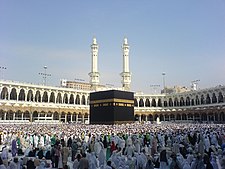Islam (/ˈɪslɑːm/;[A] Arabic: اَلْإِسْلَامُ, romanized: al-’Islām, [ɪsˈlaːm] (![]() listen) "submission [to God]")[1] is an Abrahamic monotheistic religion teaching that Muhammad is a messenger of God.[2][3] It is the world's second-largest religion with 1.9 billion followers or 24.9% of the world's population,[4] known as Muslims.[5] Muslims make up a majority of the population in 51 countries.[6] Islam teaches that God is merciful, all-powerful, and unique,[7] and has guided humanity through prophets, revealed scriptures, and natural signs.[3][8] The primary scriptures of Islam are the Quran, believed to be the verbatim word of God, as well as the teachings and normative examples (called the sunnah, composed of accounts called hadith) of Muhammad (c. 570 – 632 CE).[9]
listen) "submission [to God]")[1] is an Abrahamic monotheistic religion teaching that Muhammad is a messenger of God.[2][3] It is the world's second-largest religion with 1.9 billion followers or 24.9% of the world's population,[4] known as Muslims.[5] Muslims make up a majority of the population in 51 countries.[6] Islam teaches that God is merciful, all-powerful, and unique,[7] and has guided humanity through prophets, revealed scriptures, and natural signs.[3][8] The primary scriptures of Islam are the Quran, believed to be the verbatim word of God, as well as the teachings and normative examples (called the sunnah, composed of accounts called hadith) of Muhammad (c. 570 – 632 CE).[9]
Muslims believe that Islam is the complete and universal version of a primordial faith that was revealed many times before through prophets, including Adam, Abraham, Moses, and Jesus.[10] Muslims consider the Quran in Arabic to be the unaltered and final revelation of God.[11] Like other Abrahamic religions, Islam also teaches a final judgment with the righteous rewarded in paradise and the unrighteous punished in hell.[12] Religious concepts and practices include the Five Pillars of Islam, which are obligatory acts of worship, as well as following Islamic law (sharia), which touches on virtually every aspect of life and society, from banking and welfare to women and the environment.[13][14] The cities of Mecca, Medina and Jerusalem are home to the three holiest sites in Islam.[15]
From a historical point of view, Islam originated in early 7th century CE in the Arabian Peninsula, in Mecca,[16] and by the 8th century, the Umayyad Caliphate extended from Iberia in the west to the Indus River in the east. The Islamic Golden Age refers to the period traditionally dated from the 8th century to the 13th century, during the Abbasid Caliphate, when much of the historically Muslim world was experiencing a scientific, economic, and cultural flourishing.[17][18][19] The expansion of the Muslim world involved various caliphates and states such as the Ottoman Empire, trade, and conversion to Islam by missionary activities (dawah).[20]
Most Muslims are of one of two denominations: Sunni (85–90%)[21] or Shia (10–15%).[22][23][24] Sunni and Shia differences arose from disagreement over the succession to Muhammad and acquired broader political significance, as well as theological and juridical dimensions.[25] About 12% of Muslims live in Indonesia, the most populous Muslim-majority country;[26] 31% live in South Asia,[27] the largest percentage of Muslims in the world;[28] 20% in the Middle East–North Africa, where it is the dominant religion;[29] and 15% in sub-Saharan Africa.[29] Sizable Muslim communities can also be found in the Americas, China, and Europe.[30][31][29] Islam is the fastest-growing major religion in the world.[32][33]
Etymology
In Arabic, Islam (Arabic: إسلام, "submission [to God]") is the verbal noun originating from the verb سلم (salama), from triliteral root س-ل-م (S-L-M), which forms a large class of words mostly relating to concepts of wholeness, submission, sincerity, safeness, and peace.[34] Islam is the verbal noun of Form IV of the root, and means "submission" or "total surrender". In a religious context, it means "total surrender to the will of God".[1][35] A Muslim (Arabic: مُسْلِم), the word for a follower of Islam, is the active participle of the same verb form, and means "submitter (to God)" or "one who surrenders (to God)." The word Islam (submission) sometimes has distinct connotations in its various occurrences in the Quran. In some verses, there is stress on the quality of Islam as an internal spiritual state: "Whoever God wills to guide, He opens their heart to Islam."[i][35] Other verses connect Islam and religion (dīn) together:[ii]
Others describe Islam as an action of returning to God—more than just a verbal affirmation of faith.[iii] In the Hadith of Gabriel, Islam is presented as one part of a triad that also includes imān (faith), and ihsān (excellence).[36][37]
The word silm (Arabic: سِلْم) in Arabic means both peace and also the religion of Islam.[38] A common linguistic phrase demonstrating its usage is "he entered into as-silm" (Arabic: دَخَلَ فِي السِّلْمِ) which means "he entered into Islam," with a connotation of finding peace by submitting one's will to the Will of God.[38] The word "Islam" can be used in a linguistic sense of submission or in a technical sense of the religion of Islam, which also is called as-silm which means peace.[38]
Islam was historically itself called Mohammedanism in the English-speaking world. This term has fallen out of use and is sometimes said to be offensive, as it suggests that a human being, rather than God, is central to Muslims' religion, parallel to Buddha in Buddhism.[39] Some authors, however, continue to use the term Mohammedanism as a technical term for the religious system as opposed to the theological concept of Islam that exists within that system.
.
.
.
Go here for complete article:
The History & Religion of Islam
.
.
.


